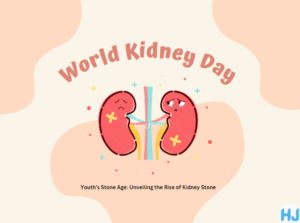In today’s fast-paced world, it’s no secret that many young people are facing health challenges that were once considered more common among older adults. One such issue that’s on the rise among the youth generation is kidney stones. These painful deposits can wreak havoc on one’s quality of life, leading to discomfort, hospital visits, and sometimes even surgery. So, why are kidney stones becoming increasingly prevalent among young people?
1.No Proper Hydration:
In today’s digital age, many young people are glued to their screens, often forgetting to drink enough water throughout the day. Dehydration is a significant risk factor for kidney stone formation because it can lead to concentrated urine, making it easier for minerals and salts to crystallize and form stones in the kidneys.
2.No Balanced Diet:
The youth generation’s diet trends often lean towards convenience foods, fast food, and sugary beverages, all of which can contribute to the development of kidney stones. Diets high in sodium, refined sugars, and animal proteins increase the risk of stone formation by altering urinary pH levels and promoting the accumulation of stone-forming substances in the kidneys.
3.No Active Lifestyle:
Sedentary behavior is rampant among young people, with many spending prolonged hours sitting in front of screens or engaging in minimal physical activity. Lack of exercise can impair metabolic processes, disrupt hormonal balance, and contribute to obesity, all of which are risk factors for kidney stone formation.
4.No Awareness:
Many young individuals are unaware of the factors that contribute to kidney stone formation and may overlook symptoms until they experience excruciating pain. Delayed diagnosis and treatment can exacerbate the condition and lead to complications.
5.No Preventive Measures:
Due to a lack of awareness or misconceptions about kidney stones being a condition primarily affecting older adults, young people may not take preventive measures to reduce their risk. Simple lifestyle modifications, such as staying hydrated, adopting a balanced diet, and staying active, can significantly lower the likelihood of developing kidney stones.
6.No Stress Management:
Chronic stress can have detrimental effects on overall health, including kidney function. Young people today often face immense pressure from academic, professional, and social obligations, leading to elevated stress levels. Stress triggers the release of certain hormones that can affect kidney function and contribute to the formation of kidney stones.
7.No Regular Check-Ups:
Many young people forego routine health check-ups, believing that they are too young to worry about health issues. However, regular check-ups are essential for early detection and management of underlying health conditions, including kidney stones. Routine screenings can help identify risk factors and enable timely interventions to prevent complications.
conclusion:
The rising incidence of kidney stones among the youth generation is a cause for concern. By understanding the contributing factors and taking proactive steps to address them, such as staying hydrated, maintaining a balanced diet, staying active, managing stress, and attending regular check-ups, we can work towards reversing this trend and promoting better kidney health for future generations.
Similar FaQ
What is the theme for world kidney Day 2024?
Kidney Health for All – Advancing Equitable Access to Care and Optimal Medication Practice,”
Why is kidney awareness important?
You can lose up to 60% of your kidney function before you notice any problems.
What are the colors for World Kidney Day 2024?
Yellow representing urine, red symbolizing blood, and blue denoting water.
When did World Kidney Day start?
World Kidney Day is a global healthcare event celebrated on the 2nd Thursday in March every year since 2006
Who started World Kidney Day?
The International Society of Nephrology (ISN) and the International Federation of Kidney Foundations – World Kidney Alliance (IFKF-WKA).

